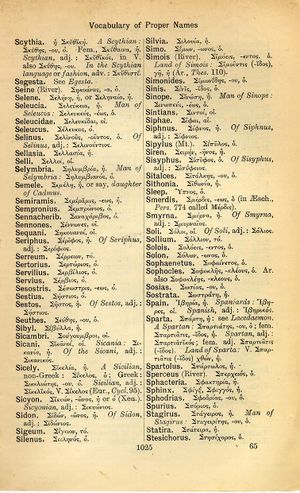Selinus
English > Greek (Woodhouse)
Σελινοῦς, -οῦντος, ὁ.
Of Selinus, adj.: Σελινούντιος.
Latin > English (Lewis & Short)
Sĕlīnūs: untis, f., = Σελινοῦς.
I A town on the coast of Sicily, near Lilybœum, now Pileri: palmosa, Verg. A. 3, 705; Sil. 14, 201.—Hence,
1 Sĕlīnūsĭus, a, um, adj., of or belonging to Selinus, Selinusian: creta, Vitr. 7, 14; Plin. 35, 6, 27, § 46; 35, 16, 56, § 194.—
2 Sĕlīnuntĭi, ōrum, m., the inhabitants of Selinus, Plin. 3, 8, 14, § 91.—
II A town on the coast of Cilicia, now Selinty, Plin. 5, 27, 22, § 92; Liv. 33, 20, 5.—Also, a river near it of the same name, Luc. 8, 260.
Latin > French (Gaffiot 2016)
Sĕlīnūs,¹⁶ ūntis, f., m. (Σελινοῦς), Sélinonte
1 f., ville de Sicile : Virg. En. 3, 705 ; Sil. 14, 200
2 m., ville et fleuve de Cilicie : Liv. 33, 20, 5 ; Luc. 8, 260.
Latin > German (Georges)
Selīnūs, ūntis, f. (Σελινοῦς), I) eine Seestadt auf Sizilien, nach dem dort häufig wachsenden Eppich (σέλινον) so genannt, j. Selinonto, Verg. Aen. 3, 705. Sil. 14, 200. – II) Stadt in Cilicien, später Traianopolis gen., j. Selenti, Liv. 33, 20, 4: dabei ein gleichnam. Fluß, Lucan. 8, 260. – Dav.: A) Selīnūntiī, ōrum, m., die Einw. von Selinus (in Cilicien), die Selinuntier, Plin. – B) Selīnūsius, a, um, selinusisch, terra, die in der Medizin bekannt war, wahrsch. unsere »Schaumerde«, Vitr. u. Plin.

